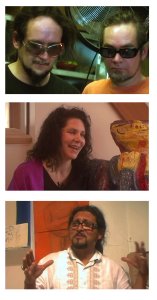Posted by Elena del Valle on September 15, 2006
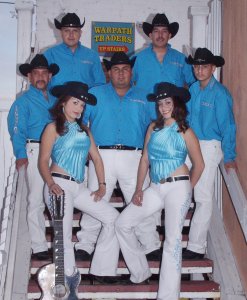
Las Florecitas
Photos: Pochteca Media
The city of Laughlin in Nevada will salute Hispanic Heritage Month with the third annual Viva Laughlin! from October 6 through October 9. The event will offer Latino entertainment options in Laughlin’s casino resorts. This small city in Nevada experienced a surge of casino construction in the 1980s. Today there are nine hotel casinos, where Los Angeles Hispanics alone make an average of 3.2 casino visits per year.
“It’s a smaller scale and it has a small town feel and more people feel at home,” said Minerva Partida, media director for Pochteca Media, which helped organize and produced the event with the Laughlin Tourism Committee and the Las Vegas Convention & Visitors Authority. “In the last two years, there is combined revenue of $4 million and last year it sold out. This event has also introduced the city to the public.”
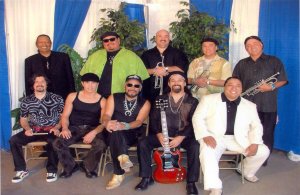
Malo band
This year’s version of Viva Laughlin! will appeal to an older crowd by showcasing music veterans who established their careers over twenty years. Three-time Grammy Award winning Tejano singer La Mafia will perform every night at Don Laughlin’s Riverside Resort in Don’s Celebrity Theater. Legendary Tejano superstar Little Joe y La Familia will also perform on October 7 at the Flamingo Laughlin at 8 p.m. Varied music from bands such as Malo and Las Florecitas will be part of the event including rancheras, polkas, and cumbias.
Viva Laughlin will also include a beauty contest featuring Miss Hawaiian Tropic Latina models on Saturday, October 7 at the Colorado Belle Hotel Casino; as well as the first Mexican poker tournament hosted by the Colorado Belle Hotel in the Casino Poker Room on Saturday, October 7 at 1 p.m. More information is available at VisitLaughlin.com — Sergio Carmona
Posted by Elena del Valle on September 14, 2006
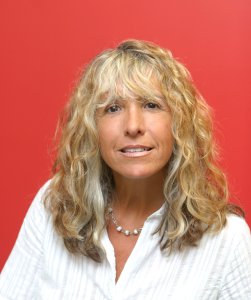
Adriana Eiriz, manager, Vivar Advertising
Photo: Vivar Advertising
Last month, Adriana Eiriz, manager for the United States Hispanic direct response agency Vivar Advertising, became the first Latin American female elected to the Electronic Retailing Association’s (ERA) board of directors. Eiriz, a native of Argentina is also the former chair of ERA’s U.S. Hispanic Council.
“Adriana is a perfect addition to the ERA board because she represents one of the fastest growing segments in the advertising industry,” said Gerald Bagg, CEO of Vivar Advertising. “Her 19 years experience in the Hispanic marketplace will bring a fresh perspective to the board and help the entire segment flourish.”
Eiriz has been Vivar’s manager since its inception in 2005 and is responsible for the agency’s strategic initiatives, new business development and supervision of key agency and client relationships. She received the “Greatest Contribution to the U.S. Hispanic Market” award from ERA in January.
“I think she’ll be a superb board member,” said Sigi Friedman, vice
president, Board, International Committees and Councils, ERA. “By
leading the ERA U.S. Hispanic Council, she increased its members and as a board member, I’ve no doubt she’ll contribute strong strategy and
vision.”
Eiriz began her career as the head of U.S. Hispanic and Latin American Sales and Distribution at Lexicon Marketing. At Lexicon, she was responsible for the launch of the company’s licensed “Disney’s World of English” for children. Following her nine years there, she joined Latin Links Inc. and helped the agency triple its Spanish product revenues in the U.S., Mexico, and Puerto Rico. — Sergio Carmona
Posted by Elena del Valle on September 13, 2006
By Tony Malaghan, CEO, Arial International
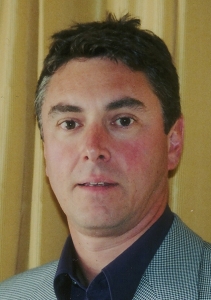
Tony Malaghan, CEO, Arial International
Photo: Tony Malaghan
In today’s highly competitive marketplace, call centers are taking steps to provide best-in-class service. If your company is servicing multilingual customers, it is reasonable they would expect to receive excellent service in whatever language they speak. For those servicing US Hispanic customers, only the largest or most specialized companies are able to staff call center representatives to handle all their calls in one language. Most bilingual call center customer service, telemarketing and collection agents in the US handle both English and Spanish calls randomly throughout the day so that companies can meet service level goals, schedule enough agents during peak times and optimize the use of inbound and outbound call center technology. Therefore, these call center agents must be able to competently communicate and be proficient in both languages in the specialized vocabulary of your industry.
Before we begin to address Business Spanish Call Center Certification, let’s first look at one of the most common issues raised by call center managers when talking about the US Hispanic market: call duration, which highlights one of the many differences between this market and the general market. Most managers are aware that Spanish calls tend to last longer, but few are aware of the variety of reasons this occurs:
Click here to read the complete article
Hispanic Marketing and Public Relations book
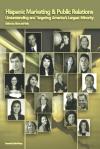
To purchase a copy of the Hispanic Marketing & Public Relations book featuring “Effective Translations,” a chapter by Tony Malaghan, CEO, Arial International visit the HispanicMPR.com Resoures Section
Posted by Elena del Valle on September 12, 2006
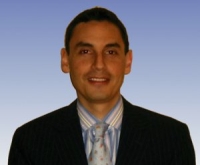

Carlos Alfaro, editor, Hispanic Trends and Elena del Valle, editor, HispanicMPR.com
This month’s lunch meeting of the Gold Coast Public Relations Council will focus on Hispanic media. During the September 19 meeting, the editors of three Hispanic publications and one website will discuss “How to Reach and Pitch Hispanic Media” with public relations professionals at The Atrium in Boca Raton. Editors Elena del Valle of Hispanic Marketing & Public Relations.com, Carlos Alfaro of Hispanic Trends magazine, Em Mendez of La Palma, and Debbie Ramirez of El Sentinel will explain their editorial operations. The cost for lunch is $15 for members and $20 for guests.
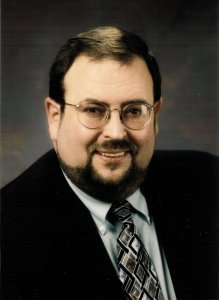
Gary Schweikhart, co-founder and president, Gold Coast PR Council
“Lunch meetings of the Gold Coast PR Council give our members a chance to meet and network with media decision-makers. With the growing influence of Hispanic media in South Florida, this will be a valuable opportunity to find out important information, such as deadlines and the way in which the editors like to receive pitches (by phone or email), even something as important as to whether or not they accept press releases written in English or should we have them translated into Spanish first,” said Gary Schweikhart, co-founder and president of the Gold Coast PR Council. “This is really a great opportunity to get one-on-one with some key editors, so the next time one of our PR professionals call the editor of these Hispanic publications, they can say, ‘Hey, remember me? I met you at the Gold Coast PR Council lunch, and do I have a great story for you…”
“How to Reach and Pitch Hispanic Media” will be divided into three segments. From 11:30 a.m. to 12 p.m. attendees will have an opportunity to network; from 12 to 12:15 p.m., there will be lunch and organizational announcements; and from 12:15 to 1:15 p.m., there will be a presentation followed by a question and answer session.
The Gold Coast PR Council is an independent group of public relations, marketing and communications professionals from Palm Beach and Broward counties. The Gold Coast PR council holds networking and educational lunch meetings, such as this one, on the third Tuesday of every month. More information is available online at GCPRC.com — Sergio Carmona
Hispanic Marketing and Public Relations book

To purchase a copy of the Hispanic Marketing & Public Relations book edited by Elena del Valle, principal LNA World Communications, visit the HispanicMPR.com Resoures Section
Posted by Elena del Valle on September 11, 2006
Click here to sponsor a HispanicMPR.com podcast
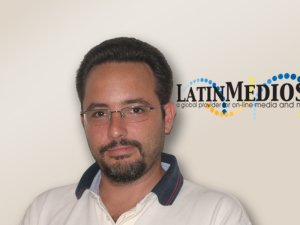
Joel Bary, CEO and board member, LatinMedios.com
Photo: LatinMedios.com
A podcast interview with Joel Bary, CEO and board member LatinMedios.com, is available on the Podcast Section of Hispanic Marketing & Public Relations, HispanicMPR.com. During the podcast, he discusses online marketing to Hispanics with Elena del Valle, host of the HispanicMPR.com podcast.
Prior to joining LatinMedios.com in 1999 as a business developer, Joel Bary was CEO of MultiMarketing Group, a Venezuelan based marketing and advertising integrated group of companies. The company offered design and manufacture of custom exhibit displays for point-of-purchase and tradeshows, market research and marketing strategy development, and production of promotional and marketing events.
He led the expansion of MultiMarketing Group into Latin America as well as the foundation of LatinMedios.com to which he was appointed CEO in 2001. LatinMedios.com is a specialized U.S. Hispanic and Latin-American online marketing and advertising agency founded in 1999 in Caracas, Venezuela. Its headquarters are in Miami, Florida with branches in Argentina, Chile, México and Venezuela.
While working with LatinMedios.com Joel has served some of the most important traditional advertising agencies in the region, as well as Fortune 500 companies including AmericanAirlines, Master Card, General Motors, Discovery Networks, Unilever, PalmOne and Nike. He studied architecture at the Simon Bolivar University in Caracas, Venezuela.
Over more than 12 years in marketing and advertising, he has been awarded several international recognitions, specifically in graphic design and corporate image. He received an honorary mention by the UNICEF, two short-listed nominations to the Lion Awards in Cannes (online advertising category) and most recently, the 2006 National Leadership Award by the National Republican Congressional Committee, naming him honorary chairman of the Business Advisory Council on behalf of the State of Florida.
To listen to the interview, scroll down until you see “Podcast” on the right hand side, then select “HMPR Joel Bary,” hit the play button or download it to your iPod or MP3 player to listen on the go, in your car or at home. You can also subscribe to the podcast by right clicking over the podcast box and selecting “copy shortcut” then inserting the URL address in the podcast section of your iTunes program listed under the “advanced” column. The podcast will remain listed in the September 2006 section of the podcast.
Click the button to hear the podcast:
Click here to sponsor a HispanicMPR.com podcast
“Marketing to Hispanics Online” audio recording
Identifying and characterizing the booming Hispanic online market


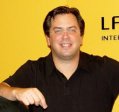
Joel Bary, Alex Carvallo and Matias Perel
To purchase a downloadable or CD audio recording with a presentation on marketing to Hispanics online by Joel Bary and interviews with Joel Bary, Alex Carvallo and Matias Perel visit the HispanicMPR.com Resources Section
Posted by Elena del Valle on September 8, 2006


Tania Waisberg and Facundo Lujan
Photos:Tania Waisberg and Facundo Lujan
Stories are frequently told of doctors and lawyers who immigrated to the United States only to wash dishes. It is unfortunate but many lose their credentials and even identities when trying to live out the American dream. Is the immigrant story the same for all professions? What happens to artists?
Tania Waisberg and Facundo Lujan set out to answer these question with their documentary “Portraits of Artists as Latino Immigrants,” scheduled for a screening at Encuentros at the Mission Cultural Center for Latino Arts in San Francisco on September 27. The 32 minute documentary tells the story of four artists who immigrated to California. Through their stories and art the artists show the process of adapting and the hopes of success that are common for immigrants to the U.S.
Artists from “Portraits of Artists as Latino Immigrants”
The artists selected for this project are in different stages of the immigration process and represent various artistic disciplines. Salvadorian born Victor Cartagena has been making art in the Bay area for more than a decade. His work can be found through out California and even Hawaii. Cartagena’s work focuses on the immigrant experience and social issues in the U.S. Using sculpture, video and audio he brings to light economic and political issues.
With a focus on glass sculpture brothers Eimar and Jamex de la Torre portray their artistic talent. Born in Guadalajara, Mexico they have spent the majority of their lives in the United States. Their work can be found in museums in Chicago, Arizona and their home state of California.
Maria Amparo Escandon is on the other side of the spectrum as a writer. She has written screenplays as well as short stories and published a novel, Santitos. Escandon was born in Mexico City and now lives in Los Angeles where she created Acento, an advertising agency for the Hispanic Market.
The film has already received awards from the Sacramento and San Francisco’s Women’s film festivals. “Portraits” was also recently screened at the Nosotros American Latino Film Festival which was founded by Ricardo Montalban. Additional information is available online at Portrait.com — Melissa Gonzalez
Posted by Elena del Valle on September 7, 2006
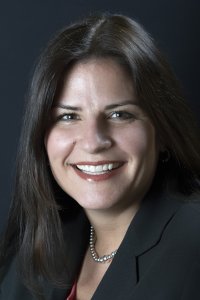
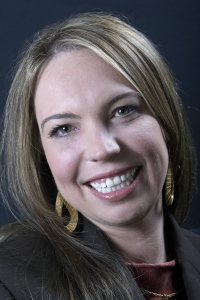
Brenda Hurley and Liria Barbosa discuss the Latino family
Photos: Brenda Hurley, Liria Barbosa
There are 42 million Latinos living in the United States, and one out of every four children is of Hispanic descent. Latino market researchers Brenda Hurley, vice president of C & R Research, and Liria Barbosa, senior research analyst of C & R Research, provide insights and information on Latino family culture in the recently released online recording “Latino Family Dynamics.” Hurley and Barbosa recorded “Latino Family Dynamics” in March 2006 with HispanicMPR.com host Elena del Valle. The two-hour recording is available for download as an MP3 file in the Resources Section of HispanicMPR.com for $69.95 and $89.95 on CD and delves into the Latino family culture.
“Understanding the Latino family dynamic helps you understand where opportunities lie. For example, Hispanic households are larger than non-Hispanic households, therefore they index higher on purchasing items such as soap and detergent,” said Hurley. “Family is at the heart of the Latino household, therefore, they make an effort to do things together as a family and get together with extended family regularly and for special celebrations.”
For “Latino Family Dynamics,” Hurley and Barbosa used different research methods, consisting of demographic statistics obtained through the U.S. Census and interview techniques including surveys. They also used photojournalism photographing Hispanic family households and a wide variety of their celebrations.
“As the Hispanic population grows, the bicultural segment of the population is also growing. Due to globalization, Internet and Cable TV, the newly arrived are acculturating at a faster rate,” said Barbosa. “Those who are fully acculturated have also developed an interest for learning about their roots and therefore start retro-acculturating. In certain areas of the country, such as many cities in Texas and Miami, Hispanics are the majority of the population. In those areas, the Hispanic culture is very intertwined with mainstream culture. Spanish language radio is more popular than English, the typical meals are a fusion of the Hispanic and American foods and common Spanish words are used on an everyday basis along with English.”
Hurley and Barbosa discuss several topics regarding Latino families. Among the topics included are adapting general market messages when targeting Latinos, educational differences between U.S. born and foreign born Latinos, their purchasing habits, their family characteristics, their extended families, family responsibilities, identifying the decision maker and information provider within a family, family activities, interaction between generations, impact of acculturation on the family, and future trends.
“Diversity exists even inside the typical U.S. Hispanic household. It is not uncommon for different members of the household to have different nationalities, language preferences and language proficiency,” said Barbosa.
Barbosa is a graduate of the Burke Institute Intensive Moderator Training Program, and has a Bachelor of Science degree in Business Administration. She has headed projects including initial design, recruitment, execution, moderation, analysis and final written reports. Hurley has provided custom research solutions for her clients utilizing online and offline methodologies. Her involvement in the development of CRIMSON (C & R’s Multimedia Surveying Network) enabled her to design and execute studies using the system. Barbosa and Hurley work for Latino Eyes, a division of C & R Research. — Sergio Carmona
“Latino Family Dynamics” audio recording


Brenda Hurley and Liria Barbosa
To purchase a downloadable or CD audio recording with extended information on Latino Family Dynamics by Brenda Hurley and Liria Barbosa visit the HispanicMPR.com Resources Section.
Posted by Elena del Valle on September 6, 2006
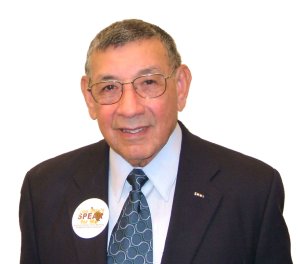
Colonel Al Rodriguez
Photo: You Don’t Speak For Me
For many Latinos May 2006, when numerous immigration related rallies and walkouts took place, will be remembered for the solidarity and determination of the Hispanic community. Different generations of Hispanics, and non Hispanics, took part in the demonstrations, from high school walkouts to retired immigrants marching in one of the many rallies throughout the country. Among the reasons they took a stand was to protest the criminalization of immigrants. Many demonstrators were against undocumented immigrants being labeled felons which would happen if some of the proposed legislatin is approved. More immigration related events are scheduled this month as a reminder to the rest of the country of the value and contributions of Latinos to America and a way to urge Congress to take immigration reform seriously. As additional demonstrations surface another Latino voice, albeit a much softer one, has risen with an opposing point of view.
You Don’t Speak For Me (YDSFM), a self described national coalition of concerned Americans of Hispanic heritage brought together by Colonel Al Rodriguez, charges that individuals and groups claim to speak on behalf of the Hispanic community in the United States as a whole without making homeland security a priority. The group is said to include first and second generation Americans as well as recent legal immigrants who believe illegal immigration harms America and guest worker amnesty will do the same.
According to the group’s website its members espouse five main principals: All immigration should be legal; undocumented immigrants should receive no benefits or privileges; amnesty should not be allowed; securing national borders should be a priority and immigration laws should be enforced; and immigrants should learn English.
“Homeland security is not a racial or ethnic issue, nor is it a partisan one. It is a matter of life and death, as current events have once again demonstrated how vulnerable our nation remains to fanatic Islamic terrorists,” said Rodriguez. “Our southern border is a sieve, a dangerous, life-threatening sieve. Criticism of the failure to control that border is, by no stretch of the imagination, an attack on any particular ethnic group. It is a legitimate criticism of the failure of the Bush Administration to protect the nation and of the people who violate our laws.
Rodriguez believes homeland security is at great risk due to the government’s failure to protect the nation’s borders. Rodriguez and his followers want to make it clear that the Hispanic community does not have a unanimous opinion on immigration issues. The organization’s members, scattered through out the country, are predominantly first generation American citizens. Coalition officers are Rodriguez, chairman, and four vice chairs, Mariann Davies, Claudia Spencer, Justin Rangel, and Maria Chojnowski.
“American Hispanics stand shoulder to shoulder with other Americans as our nation and our people face unprecedented threats to our security. If the terrorists succeed in breaching our borders and carrying out another attack, they will not discriminate in their campaign of mass murder. Pointing out that our borders are out of control is not offensive. The failure of either party to do anything about it is offensive, reckless and inexcusable,” said Rodriguez.
There are unconfirmed rumours that You Don’t Speak for Me has ties to FAIR, the Federation for American Immigration Reform, a national, nonprofit, public-interest, organization claiming 198,000 members dedicated to immigration reform. A You Don’t Speak for Me spokesperson didn’t respond to HispanicMPR.com questions on the subject. — Melissa Gonzalez contributed to this article.
Posted by Elena del Valle on September 5, 2006
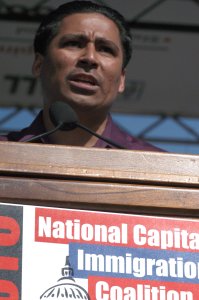
Jaime Contreras, president, National Capital Immigration Coalition and District Chair and Supervisor of SEIU Local 32BJ
Photo: National Capital Immigration Coalition
Washington, DC – The National Capital Immigration Coalition (NCIC) in partnership with the We Are America Alliance (WAAA) is planning to make a statement on September 7, 2006. They expect hundreds of thousands of immigrants, business people, students, people of faith, working families, and other supporters to converge in Washington, D.C. to urge members of Congress to pass comprehensive immigration reform before the November elections. The rally will take place on the National Mall, 3rd Street NW between Constitution and Independence Avenues, at 4 pm and will end with a march around the Capitol.
“An overwhelming majority of Americans believes that our immigration system is broken and wants Congress to find a real solution,” said Jaime Contreras, president of the National Capital Immigration Coalition and District Chair and Supervisor of SEIU Local 32BJ. “On September 7th, we will call for comprehensive immigration reform to protect all workers and stop dividing our families.”
The Washington rally is one of a series of Labor Day weekend events across the country. Other events planned include a Chicago march to the house of Speaker Dennis Hastert starting on September 1, and rallies in Phoenix on September 4 and Los Angeles on September 9. Each is unified in the call for comprehensive immigration reform they belive protects workers; stops massive deportations that divide families and communities; and provides an earned path to citizenship to undocumented people living and working in the U.S.
The mobilizations are part of the civic participation and voter registration effort announced by the WAAA in the spring. Since then, immigrants across the country have been participating in Democracy Summer, which has included advocacy drives, voter registration, and workshops on becoming a citizen.
NCIC is a group of organizations dedicated to advocating, educating, and mobilizing the immigrant community in the Washington, D.C. metro area toward citizenship and civic participation. We Are America Alliance is a newlyformed national alliance of immigrant, grassroots, labor, local, statewide and national organizations such as Coalition for Humane Immigrant Rights of Los Angeles (CHIRLA), Center for Community Change, Illinois Coalition for Immigrant and Refugee Rights (ICIRR), New York Immigration Coalition (NYIC), and National Korean American Service & Education Consortium (NAKASEC) among others. Additional information on the events is available online at NCIC.org
Posted by Elena del Valle on September 1, 2006
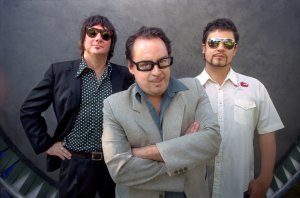
Los Tres
Photo: Los Tres
Chilean rock band Los Tres is releasing a new album, “Hagalo Usted Mismo” (Do It Yourself), on September 26, 2006. A follow up to 2001’s “Freno de Mano,” it combines melodic rock with traditional Chilean folkloric influences and instruments, and classic rock sounds. “Camino,” the first single, is described in promotional materials as having an upbeat, vintage rockabilly sound. “Camino” broke radio records for initial airplay on its Chilean release and has been going strong on rock stations throughout Mexico.
The album, produced by Joe Blaney (The Clash, Prince, Charly Garcia) was recorded earlier this year in New York City and features the participation of drummer Steve Jordan (Bob Dylan, The Rolling Stones, Eric Clapton, Aretha Franklin); and Café Tacuba’s Emmanuel del Real, who participated as an invited musician and produced and mixed several of the songs.
The collaboration with Café Tacuba was a natural step after the success of Tacuba’s four-song EP of Los Tres covers “Vale Callampa,” which brought Los Tres back into the spotlight and introduced the trio to an international audience. Del Real accompanied Los Tres before a crowd of 30,000 fans in Santiago, Chile and also at their performance at the Latin American equivalent of Coachella, Vive Latino in Mexico City.
Los Tres, originally formed in Concepcion in the late 80s, is Alvaro Henriquez (vocals, guitar, piano), Angel Parra (lead guitar) and Roberto “Titae” Lindl (bass). To listen to “Camino” from the new album, “Hagalo Usted Mismo” click on the play button below.
Click the button to hear the podcast:
Click here to sponsor a HispanicMPR.com podcast














